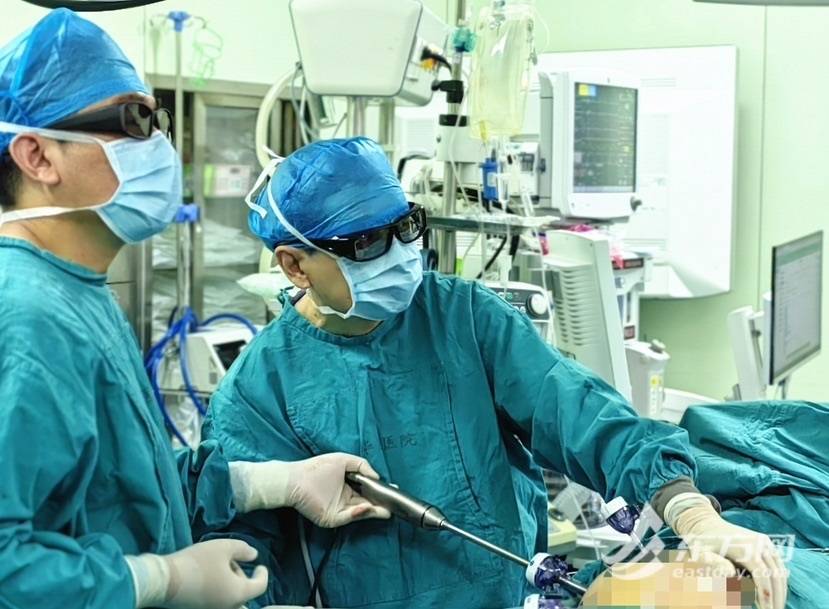Ms. Li, who is only 40 years old (alias), has been struggling to control her weight since giving birth, facing troubles such as “mobility issues,” “body image anxiety,” “self-esteem issues,” and more. Severe obesity has greatly impacted Ms. Li’s various organs, as indicated by high blood lipids, fatty liver, abnormal liver function, anemia, and metabolic syndrome found during a company health checkup.
In an effort to tackle the obesity problem, Ms. Li tried various weight loss methods including dieting, exercise, weight loss medications, traditional Chinese medicine, acupuncture, cupping, but none were effective. By chance, Ms. Li came across a short video on weight loss surgery by Professor Gu Yan’s team at East China Hospital on a social media platform, prompting her to seek help at the hospital.
At the multidisciplinary obesity clinic at Fudan University-affiliated East China Hospital, Director Gu Yan took into account Ms. Li’s busy work schedule and inability to stay in the hospital for a long time, so he arranged for a daytime weight loss surgery. After completing all preoperative examinations at the clinic, undergoing multidisciplinary assessment, receiving health education, addressing metabolic disorders, and improving organ function, Ms. Li underwent surgery on the same day she was admitted to the hospital. During the surgery, procedures such as anesthesia followed the concept of “enhanced recovery after surgery,” truly achieving “tubeless,” which means no gastric tube, drainage tube, or urinary catheter was left in place, resulting in minimal postoperative pain. On the same day as the surgery, Ms. Li was able to get out of bed; the following day, she was discharged smoothly.
Obesity has been recognized as a chronic disease by the World Health Organization, characterized by abnormal or excessive fat accumulation that can harm health, caused by a combination of genetic and environmental factors leading to chronic metabolic disorders. Obesity can lead to diabetes, heart disease, hypertension, sleep apnea, osteoarthritis, cancer, and other chronic diseases, reducing life expectancy. Globally, at least two out of five adults are affected by overweight or obesity, with a higher prevalence among adults in China.
At the same time, overweight and obesity problems among adolescents and the elderly are becoming increasingly serious, affecting the health of both the young and the old. Among Prof. Gu Yan’s patients, the youngest patient is only 14 weeks old. Prof. Gu Yan mentioned that nowadays, patients aged 14 to 65 can undergo weight loss surgery to treat obesity and metabolic disorders such as diabetes, which is not a new phenomenon. It is reported that weight loss surgeries have been performed in China for more than 20 years, with over 400 individuals undergoing weight loss surgery at East China Hospital last year. The safety and effectiveness of weight loss surgery have been thoroughly validated.
Who is suitable for weight loss surgery? Prof. Gu Yan mentioned that the body mass index (BMI) is a standard for assessing obesity and its severity. For those with BMI ≥37.5kg/m2, surgery is recommended; for those with 32.5kg/m2≤BMI <37.5kg/m2, surgery is recommended. If there are complications such as diabetes, weight loss surgery can be performed for individuals with a BMI exceeding 27.5. In Prof. Gu Yan's clinic, there are also individuals who do not meet the criteria for weight loss surgery but insist on undergoing it for aesthetic reasons. Some girls with a BMI below 24 or even not meeting the criteria for obesity hope to achieve a "thinner" look through surgery. Prof. Gu Yan emphasized the importance of having a rational view of weight loss surgery and promoting a healthy aesthetic perception.
At East China Hospital, the multidisciplinary obesity clinic is also popular, offering internal medicine interventions to regulate endocrine functions, adjust nutritional balance, and acupuncture therapy for obesity treatment. The multidisciplinary obesity clinic is staffed by authoritative experts such as Director Lu Bin from the Endocrinology Department, Director Wu Jiang from the Nutrition Department, and Deputy Director Yang Hui from the Acupuncture Department, aiming to customize personalized weight loss plans for each patient seeking weight loss through comprehensive and multidimensional assessments and interventions.
“The multidisciplinary obesity clinic advocates lifestyle changes rather than extreme dieting or excessive exercise,” said Director Wu Jiang. “In addition to causing various physiological diseases, obesity can also induce anxiety, depression, and other psychological problems. Some people try various methods such as dieting and weight loss medications, but to no avail. Some may see short-term improvement, but quickly regress, and many may even experience a cycle of ‘more weight gain after losing weight,’ ultimately giving up. Therefore, the key to successful weight loss lies in adopting the right methods.”
According to Wu Jiang, obese or overweight individuals should first follow a balanced diet, ensuring variety in food intake, a balance between meat and vegetables, and engaging in adequate exercise while ensuring sufficient sleep. Studies show that people getting less than 6 hours of sleep have a 41% higher risk of metabolic syndromes like obesity, cardiovascular diseases, and diabetes compared to those getting 6-8 hours of sleep. “There are many small tips for weight loss; for example, for those who gain weight quickly due to eating fast, we recommend using non-dominant hand for eating. We also suggest setting small goals and rewarding oneself upon completion, which will help in developing and maintaining good lifestyle habits.”
Director Lu Bin from the Endocrinology Department at East China Hospital told reporters that whether endocrine balance is maintained directly affects the difficulty of weight loss. Hormonal imbalances, such as insulin resistance, high cortisol levels, or hypothyroidism, can become obstacles in the weight loss journey. By adjusting diet, improving lifestyle, receiving necessary medical interventions, and restoring endocrine balance, effective progress in weight loss can be achieved.
Lu Bin said, “By making scientific adjustments and optimizations, healthy weight loss can be accomplished while maintaining the balance and stability of the endocrine system. Many diabetic patients have achieved good blood sugar control through scientific weight loss. Therefore, it is crucial to avoid blindly pursuing short-term effects at the expense of long-term health.”


